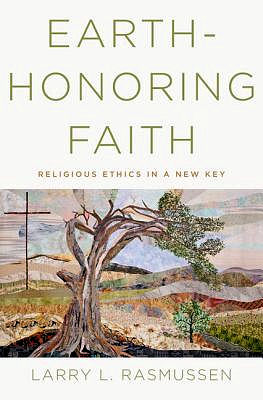
|
Posted January 16, 2013
Book: Earth -- Honoring Faith: Religious Ethics in a New Key Author: Larry L. Rasmussen Oxford University Press. New York 2012. pp. 462 An Excerpt from the Jacket:
In Earth-honoring Faith, Larry Rasmussen answers that question with a dramatically new way of thinking about human society, ethics, and the ongoing health of our planet. Rejecting the modern assumption that morality applies to human society alone, Rasmussen insists that we must derive a spiritual and ecological ethic that accounts for the well-being of all creation, as well as the primal elements upon which it depends: earth, fire, water, and sunlight. He argues that good science, necessary as it is, will not be enough to inspire fundamental change. We must draw on religious resources as well to make the difficult transition from an industrial-technological age obsessed with consumption to an ecological age that restores wise stewardship of all life. Earth-honoring Faith advocates an alliance of spirituality and ecology, in which the material requirements for planetary life are reconciled with deep traditions that include mysticism, sacramentalism, prophetic practices, asceticism, and the cultivation of wisdom. It is these shared spiritual practices that can produce a chorus of world faiths to counter the consumerism, utilitarianism, alienation, oppression, and folly that have pushed us to the brink. An Excerpt from the Book: We might call this a vision of "ecological civilization" as the alternative to industrial civilization. Its nucleus is oikos, Greek for "house" and "household." Oikos is the root of "ecumenics," "ecology," and "economy, with house and household referring to the households of faith of early Christians, even to Earth itself as the "world house." The oikoumene, whence come "ecumenics" and "ecumenical," is the whole inhabited earth or imperial claims to it. (The Roman Empire referred to itself as the oikoumene.) The emphasis of oikoumene falls on the unity of the household --- all belong to the same family --- and nurturing this unity across the expanse of inhabited terrain. Thus the Christian households of faith (oikoi) made a conscious effort to stand for the whole church in each place, scattered as it was on three continents around the Mediterranean basin. This identity and mission required instruction, called oikeiosis. The word was borrowed the Stoics, for whom it meant "appropriation" in the sense of making something one's own whether as a member of the family, society, the human race collectively, or the world (cosmos) as a whole. Instruction included basic teaching, core practices, and rites of passage. If an alternative way of life to that of the empire was to take shape, community formation, including moral formation of both character and conduct, was required. The Christian householder himself or herself was the oikonomos, literally "the economist," the one who knows the house rules (oikos + nomos, law) and cares for the material well-being of its members. (Oikonomos is often translated as "steward" or "trustee," even though "economist" is the more exact rendering.) Household dwellers are oikeioi. Their task, too, is to build the community and share the gifts of the Spirit for the common good. First Corinthians 12:4-7 puts it like this: "Now there are varieties of gifts, but the same Spirit; and there are varieties of services, but the same Lord; and there are varieties of activities, but it is the same God who activates all of them in everyone. To each is given the manifestation of the Spirit for the common good." This common good includes meeting one another's material needs (Acts 2:4-4). This is designated oikodome, the continual up-building of the household, the oikos. Such care requires knowing the household's logic and law, which is exactly what "ecology" means (oikos + logos), knowledge of relationships that build up and sustain. Table of Contents: Part One The creature we are The world we have The faith we seek The ethic we need: change and imagination The ethic we need: good theory The ethic we need: community matrix The ethic we need: tilling and keeping Part Two Asceticism and consumerism The sacred and the commodified Mysticism and alienation Prophet-Liberative practices and oppression Wisdom and folly Closing |
|
